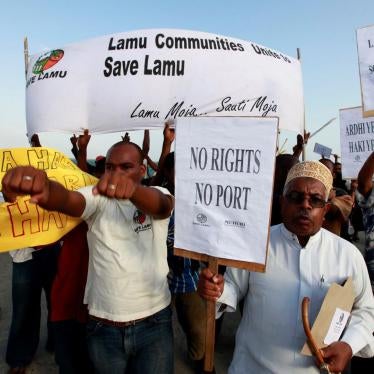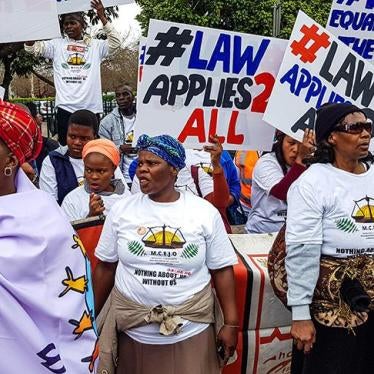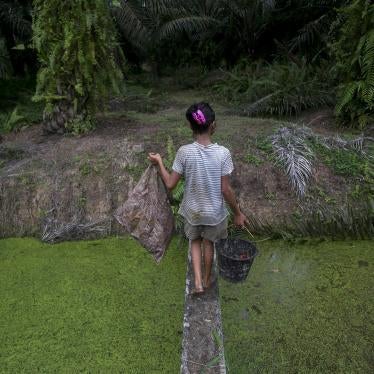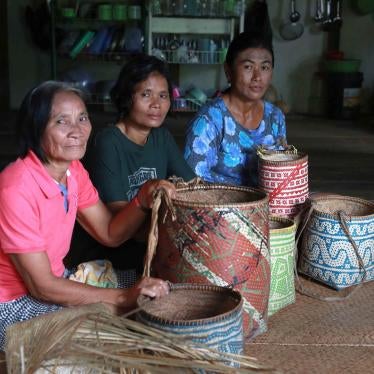On a rainy day in April 2018, I rode a small speedboat along the Kapuas River in West Kalimantan province, Indonesia, headed for three tidal swamp villages, whose residents had protested against the expansion of oil palm plantations on their farmland and settlements.
The government had permitted a palm oil company to establish and expand its plantations in the area. The company had cleared and drained peatlands, an important carbon sink, and planted oil palm trees on land villagers had been using for decades. In the process, it had completely disregarded how its actions violated the villagers’ land rights, led to the loss of livelihood for the village women, who had mostly farmed the land, and contributed to the global climate crisis.
Villagers had little information about where the oil palm plantations started or ended and how or where it overlapped with their land. Women had even less information than men, and had fewer avenues to negotiate directly with the company about their losses. During my visit, these women told me that when they started protesting against the expansion of the palm plantations, the company met only with the men of the village to discuss possible compensation.
The loss of livelihood has rendered the village women even more vulnerable to climate change, as it has affected their food security and source of income. They will face more difficulties overcoming or adapting to its effects and will be among the hardest hit.
Around the world, there are many similar stories. Women struggle daily to have their land and property rights recognized and respected. At the same time, governments are failing to prioritize women’s participation in developing and carrying out ambitious climate action plans to meet the goal of keeping temperatures from rising more than 1.5 degrees Celsius and to avoid the most dramatic effects, including for land rights and women’s rights.
As urgent climate action plans are drawn, we also need to take into account how gender discrimination facilitates environmental degradation and weakens forest governance initiatives and how women still bear the brunt of local environmental harm and climate change. We need to ensure that women and climate-affected communities have power and a voice.
Women often cannot meaningfully participate in decision-making around the natural resources – like water, forests, and land – where they live. Most rural women do not have equal access to and control over natural resources on par with men in their community.
This exclusion can be devastating for women and their families. Globally, large-scale land deals and commercial agriculture touted as development opportunities have worsened poverty and food insecurity in local communities they affect. Forests are cleared or enclosed, restricting access for foraging. Villagers lose access to farmland for subsistence and revenue from crop sales. These practices disproportionately affect working women, who are forced to take menial and laborious jobs on commercial farms or plantations or migrate to urban areas in search of employment.
At the same time, women have to combine their hours working on the plantation with work at home fetching water, food, caregiving, which intensifies their workload without fair compensation. Climate change will make these tasks only harder, further exacerbating gender inequality.
People in the villages I visited in West Kalimantan acknowledged that some people found paid employment when plantations arrived. But they complained of having no other options to sustain their families when they were previously able to live off their land and access to the forest. Some villagers said the employment terms were unfair, with unattainable daily work targets.
Whole families sometimes have to work, including children, to meet company targets even though only one family member might be employed and paid by the plantation. Bethari, a 44-year-old woman with an eight-month-old infant, told me: “My husband works at the plantation. His sons and I must help him make the target. I help while carrying the baby, I can’t leave her at home.”
Often, expansion of plantations contributes to environmental degradation, further harming the lives and health of residents. Palm oil companies dig huge ditches to drain peatlands to prep for planting. Their actions degrade the peat structure and surrounding environment, and release into the atmosphere huge amounts of greenhouse gases, including carbon dioxide, from centuries of carbon stored within peat soils. Excessive draining of peatlands was a key contributor to Indonesia’s forest fires in 2015.
If governments do not monitor how companies acquire land and manage their operations, people and the immediate environment are at risk. When peatland and forests are involved, we all suffer because carbon emissions from the destruction of these carbon sinks drive the climate crisis globally.
A week after visiting the villages affected by oil palm cultivation, I headed back to Pontianak, the capital of West Kalimantan. I watched mangroves clustered along the banks of the Kapuas speed by. I could not help but feel angry that because the Indonesian government is not doing enough to protect land and people, many of the mangroves might also be cleared to make way for plantations.
Indonesia is just one of many countries that needs to step up efforts to safeguard the land rights of local communities, ensure gender equality, and protect the environment. Governments need to uphold commitments to drastically reduce emissions, ensure that strategies to conserve carbon sinks like forests and peatlands also protect land rights and other human rights of rural communities, and ensure that women meaningfully participate in natural resource and climate decisions at all levels.










